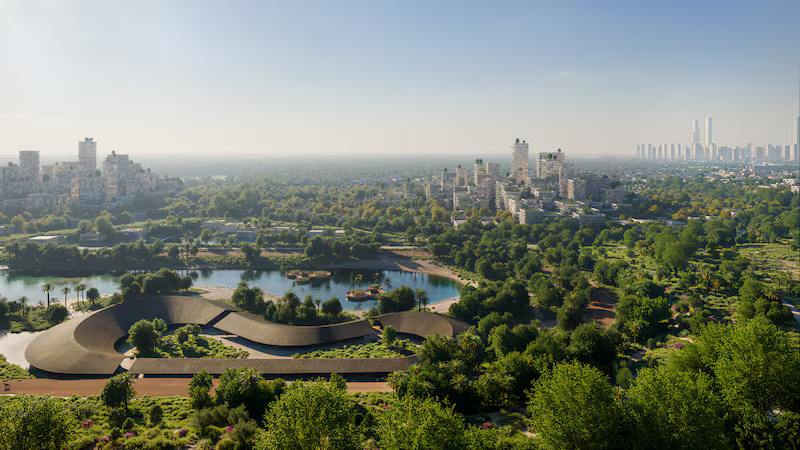An ambitious master plan has been proposed to turn the region surrounding Dubai’s historic Jebel Ali Racecourse into a huge urban district of islands with a network of walkable residential blocks and a central public park.
The 5-square-kilometer complex will include equestrian venues, cultural institutions, and mixed-use developments, creating a “archipelago of urban islands amid a sea of green.”
Jebel Ali Racecourse, located next to Emirates Golf Club and near Dubai’s The Greens and Emirates Hills districts, would be conserved under the forward-thinking policy.
The large project is being managed by Bjarke Ingels Group (Big), a leading global architecture and design firm, in collaboration with A.R.M. Holding, a UAE-based private investment corporation.
Construction is planned to begin early next year, with phases covering housing, education, hospitality, and public infrastructure.
“Occupying the grounds of Dubai’s historic Jebel Ali Racecourse, this project is an archipelago of urban islands in a sea of green – reimagining the site not as a collection of objects in isolation, but as a living landscape of interconnected communities,” said Bjarke Ingels, founder and creative director of Big.
He stated that a large central park will serve as a “green spine” for a community that values sustainability and the environment.
The urban district will have shaded communal plazas and streets to encourage walking and cycling.
Self-driving shuttles are operating in the area to ensure easy access to public transport.
The initiative is just the latest major development project to help Dubai 2040 City Master Plan monitor city expansion and help to quickly expand population growth.
The master plan aims to create a ’20-minute city’, where residents can reach 80% of their daily needs and destinations within 20 minutes on foot or by bicycle.
Mega projects take shape
The Jebel Ali Racecourse renovation is one of several significant development efforts underway to solidify Dubai’s reputation as a desirable place to live, work, and conduct business.
In October, Sheikh Mohammed bin Rashid, Vice President and Ruler of Dubai, released an updated master plan aimed at positioning Expo City Dubai as a driver for the emirate’s development.
The district – which hosted Expo 2020 Dubai and the Cop28 climate talks in 2023 – would become a “hub for pioneers, entrepreneurs and investors” and was central to a long-term vision to “propel the UAE into a new era of prosperity”.
Expo City Dubai, which spans 3.5 square kilometers, will house over 35,000 people and 40,000 professionals as it grows into a hub for businesses, investors, homes, and visitors.
In 2023, Sheikh Mohammed unveiled a new idea for Palm Jebel Ali, a luxury lifestyle megaproject that will cover double the area of Palm Jumeirah.
The long-planned tourist destination, spearheaded by major developer Nakheel, would cover 13.4 square kilometers and contain 80 hotels and resorts, green areas, and other leisure and retail facilities.
The project will add around 110 kilometers of shoreline to Dubai, providing beachside living to 35,000 families.
The Dubai Walk Master Plan, released in December 2024, calls for more than 3,000 kilometers of walkways and 110 new bridges and tunnels.
It will include a walking network featuring 112km of waterfront paths, 124km of green walking paths and 150km of rural and mountain paths for pedestrians.
Rich sporting legacy
Jebel Ali Racecourse has been instrumental in Dubai’s dramatic climb to the status of a global horse racing superpower.
The track and grandstand were built in 1990, and the first racing season took place the following year.
Lester Piggott, a renowned British champion jockey, was among the athletic icons to take to the Jebel Ali turf in its early years, helping to pave the way for the emirate’s greatest glory in the sport of kings.
The first Dubai World Cup was conducted in 1996, and it has since evolved to become one of the wealthiest events on the calendar, with a $12 million prize purse available for this year’s event.
Every year, Jebel Ali Racecourse stages more than 70 races, with over 10,000 people in attendance.
